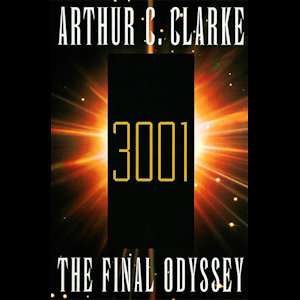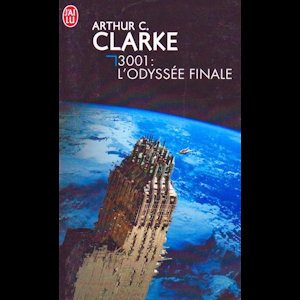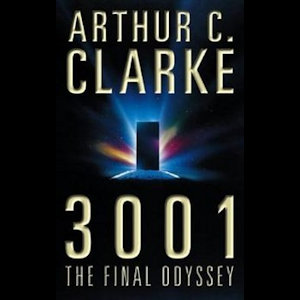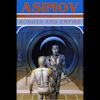The Summer of Arthur C. Clarke: 3001: The Final Odyssey
Before I begin, welcome to my Summer of Arthur C. Clarke. On the heels of last year's popular Slasher Summer, this year I'm leaving behind the guilty pleasure of the niche horror genre and exploring something a little closer to my own heart: namely science-fiction. Of all the sci-fi greats, none have influenced me more than the late Arthur C. Clarke, my personal favorite of the "Big Three" from the Golden Age of the genre (Asimov, Clarke, and Heinlein). This summer, I am going to look at a few of his most famous works, including the entirety of his 2001 series and the tiny handful of adaptations that have been made for film, television, and video games. Strap in and prepare yourselves for a journey into the stars and the mind, and let us never forget how much richer the world of fiction is for having been blessed by the incomparable Sir Arthur C. Clarke.
 | | The cover of my edition |
The frozen body of Frank Poole is found on the outskirts of the solar system exactly one thousand years after he was lost on the ill-fated Discovery mission. Revived by the miraculous science of this new age, Poole must acclimate himself to his new surroundings and his newfound fame. Eventually, he decides to visit the Jupiter he never reached, now a tiny star of its own, with hopes of contacting his lost colleague, Dave Bowman, now an incorporeal Star Child melded with the artificial consciousness of HAL-9000. What he learns once there threatens to once again throw the human race into chaos.
3001: The Final Odyssey is an interesting beast, in that it suffers from many of the structural problems of 2061 but manages to be a superior novel that largely succeeds in capping off Clarke's tetralogy. Over two-thirds of the novel chronicles Poole learning about the state of humanity in the year 3001, but it's far more interesting than Halley's comet. A lot of this comes down to Clarke finding a better foil for the readers in the character of Frank Poole, a man as unfamiliar with his surroundings as we are. He's not a particularly compelling character, but he has just enough personality to carry the narrative.
Clarke has a lot to say about the future, and it's interesting to see how his ideals have evolved into the latter part of his writing career. (Published in 1997, this would be his last novel written without a collaborator.) He's a tiny bit more cynical about human nature, but also more of a realist. His grasp of science and technology is also incredibly mature, though it hasn't lost any of the imagination he demonstrates in early novels like The City and the Stars. Many core concepts found in Clarke's other works are found here--such as interplanetary colonization, progressive sexual politics, religion's end, and the space elevator--and as 3001 is one of Clarke's last novels, it can be read as his final word on many of these.
 | | I like this cover, because it doesn't just resort to showing us the monolith again |
The final act of the novel, which breaks from the book's title and takes place approximately thirty years later, is a bit more problematic, however. This is a full-on embrace of the mythology established in the first three novels, albeit with some unusual changes and omissions (which Clarke owns up to in his afterword). He finally pays off the foreshadowed threat of humanity failing to pass the cosmic test presented by the monoliths, and the story of how humanity deals with it is both clever and interesting. Unfortunately, it's over almost as quickly as it's begun, with little in the way of narrative tension or adequate build-up. Once again, Clarke foresakes traditional storytelling, and once again, it makes the final third feel so disassociated with the first two thirds that it might have made for a better novel of its own if developed into a full-length tale. It doesn't help that Clarke deliberately withholds information from the reader, information the characters possess.
Additionally, because of at least one of the aforementioned changes, it's something of a cop-out. In 2001 and 2010, Clarke makes clear that the monoliths can act as wormholes, allowing Bowman to break traditional, relativistic laws of speed and time. In this book, however, the fact that the aliens behind the monolith (which he finally names as the "Firstborn") can't travel faster than light is a key, essential plot detail. Clarke makes changes to his own mythos throughout the entire series, but most of those feel harmless, slight tweaks and updates that reflect a better understanding of science, a minor change in Clarke's perspective, or the superiority of Kubrick's adaptation. This one change, however, almost breaks the entire narrative.
Granted, Clarke would break the Firstborn even further in his "orthoquel" Time Odyssey series with Stephen Baxter, in which the Firstborn are an even greater departure from Clarke's original vision of them. We won't be covering the Time Odyssey this summer, but I highly recommend it nonetheless. There are three books in the series, starting with Time's Eye, and they involve one of the most original uses of time travel I've ever encountered, complete with Clarke's attention to realistic science and Baxter's encyclopedic knowledge of histories both real and imagined. The series does exist in a similar universe to Clarke's Odyssey books, but with a few key differences.
 | | The final monolith |
As for 3001: The Final Odyssey, its differences are a little harder to forgive, as it strives to bring an end to a thirty-year-old series. I'm also not convinced it would make a good film adaptation. There isn't much in the way of narrative direction, with most of the story essentially feeling like a guided tour of the future. This could work in the right hands, but it would be very tricky to pull off in a way that would appeal to a wide audience. As for the last third, there is a compelling conflict, but it relies on a strong familiarity with the previous books, and recapping them through exposition would be tiresome.
As I mentioned last week, the SyFy Channel has been trying to produce a miniseries based on 3001 for a few years now, though there hasn't been any firm news about it
since 2016. No doubt its fate is tied, at least in part, to the Childhood's End miniseries from 2015, but with SyFy being coy about the financial/ratings numbers and with critical reviews broadly averaging out to a high "meh," it seems unlikely that it was successful enough to fast-track another Clarke project into production. Still, with names like Ridley Scott and Stuart Beattie behind it, 3001 could be a quality series. I'm just not holding my breath.
Examined in terms of how it caps off the Odyssey series, 3001 is, in a word, adequate. It lacks the punch and thematic strength of 2001 and 2010, but it is more provocative and entertaining than 2061. It does offer up a hopeful snapshot of the future that serves as Clarke's most earnest attempt to peer through time, and it does its best to wrap up lingering plot threads concerning Dave Bowman and his new, celestial masters. It's certainly not Clarke's finest work, but it is an essential part of his bibliography. Next week, we'll change gears and examine a slightly different take on alien life in what might just be my personal favorite novel by Clarke: Rendezvous with Rama. Though not quite as well-known as 2001, Rama has been just as influential to science-fiction, for reasons we'll discuss in detail. You don't want to miss it.
-e. magill 7/5/2018
THE UNAPOLOGETIC GEEK'S
SUMMER OF ARTHUR C. CLARKE: | |
|
| MORE LIKE THIS: |

|
Robots and Empire - Summer of Asimov I
The final robot novel is more thematically dense than it might appear, but is it really more than just a bridging episode between two bigger stories? [7/9/2020]
|
|
|
|
|